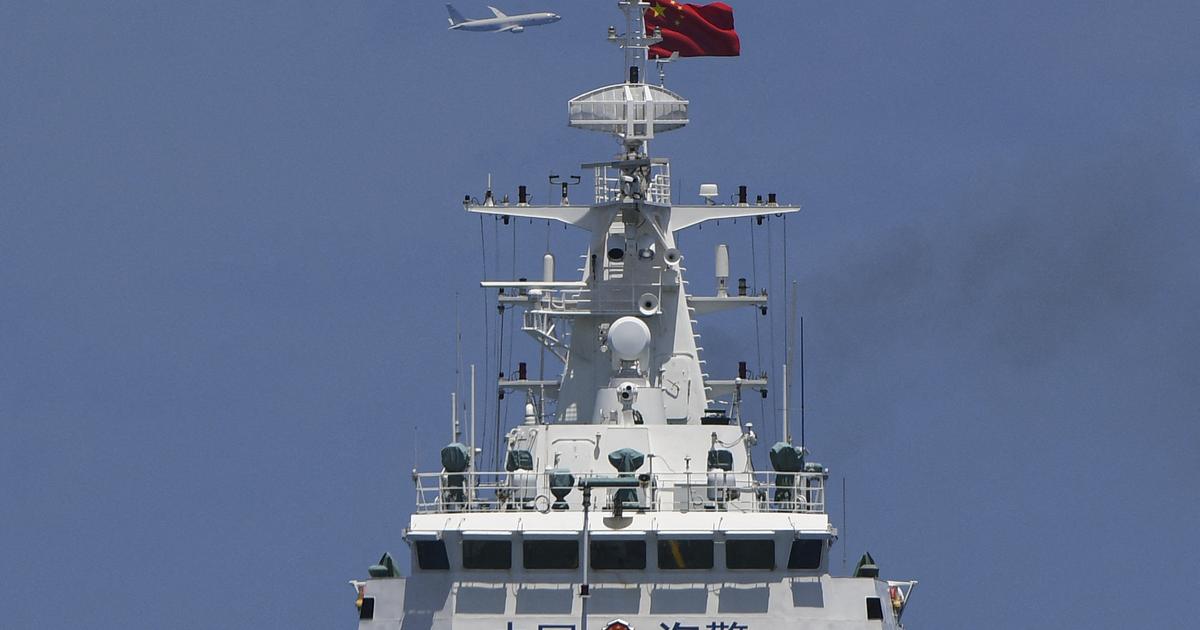China prefers... to stay away.
The Houthis are boarding cargo ships, rushing the creation of an international coalition to ensure free navigation and firing missiles towards Israel, but Beijing is watching the crisis from afar.
The second world power, through its Minister of Foreign Affairs, nevertheless
“expressed its deep concern about the resurgence of tensions in the
Red Sea
, while calling for an end to the harassment of civilian vessels”
, on 14 January.
But three days earlier, it had prudently abstained, like Russia, during the vote on a resolution of the UN Security Council which condemned
"in the strongest terms the attacks, at least two dozen, against the merchant and commercial vessels since November 19, 2023
.
Moreover, Mohammed al-Bukhaiti, a member of the political leadership of the Houthis, assured the Russian daily
Izvestia
on January 19 that
Russian-Chinese
“maritime transport
” in the region is not threatened
.
He even said he was
“ready to ensure the safe passage of their ships through the Red Sea”.
And for good reason, on December 3, a container ship belonging to Cosco, a large public Chinese maritime transport group, was hit by a rocket fired by a drone.
This Chinese wait-and-see attitude raises questions, as this sector has an important strategic aspect: 40% of trade between Asia and Europe (626 billion dollars from China to the European Union in 2022, according to
Eurostat
) crosses the Red Sea and the Suez Canal;
12% of global oil traffic circulates there;
The International Monetary Fund (IMF) warned of the risks of
“commodity inflation due to geopolitical shocks – including continued attacks in the Red Sea”
, in a document published on January 30.
The
“inverted mirror”
For Beijing, attacks in the Red Sea are not its main concern.
“Its number 1 priority is
Taiwan ,
”
confirms Mathieu Duchâtel, director of the Asia program at the Institut Montaigne.
And therefore, in turn, anything that temporarily weakens or distracts the United States from Southeast Asia delights China.
Then, the Middle Kingdom is also being constructed as a rival to the United States, but seems to adopt a strategic positioning of an
“inverted mirror”
.
“It is indeed a competition for image among developing countries, where China exploits the American position in support of Israel to distinguish itself.
By maintaining a certain neutrality and a cautious position, it lets the United States sink into an interventionist trap which costs it resources and traps it vis-à-vis certain countries
,” notes the expert.
Read alsoIn the Middle East, a game of go pits Chinese and Americans against each other
This competition, old, is global.
In the Middle East, it is characterized in particular by the easing of tensions between Saudi Arabia and Iran, two regional rivals, under Chinese aegis.
These two countries had severed their diplomatic relations in 2016, and decided to reopen them last May thanks to the intermediary of Beijing.
Conversely, the United States has always supported its Saudi ally and vilified Iranian expansionism, even going so far as to kill commanders of Revolutionary Guard units in Iraq and Syria.
A policy continued, for example, on February 2 with more than 85 targets struck for their links with Iran.
In addition, Beijing can also take advantage of this slowdown in maritime activity in Bab-el-Mandeb to harm a competing project of the New Silk Roads: the
India Middle East Europe Economic Corridor
, supported by India.
This project, officially launched at the G20 summit in New Delhi in 2023, plans to connect India, the Middle East and Europe by maritime and rail lines crossing Saudi Arabia to Israel, then to Europe.
“China took advantage of the crisis in Bab-el-Mandeb to create a maritime security company that supplies them in the region.
A way of both providing a response to tensions and harming the Indian project
,” says Emmanuel Lincot, professor at the Catholic Institute of Paris and sinologist.
Chinese caution in the Red Sea is therefore part of a more global strategic positioning.
For Beijing, the cost/benefit of military intervention to protect its ships is less advantageous than letting the United States damage its image.
However, China would have the means.
Since 2016, it has had a military base, with unknown personnel, in Djibouti.
Its navy regularly escorts merchant ships in the area.
Between 2012 and 2016, the year the base opened, it protected 4,640 boats in 450 missions.
“This policy of escorting ships in the region has been important for the development of Chinese defense policy over the last 15 years
,” adds Mathieu Duchâtel.
“It was designed by the father of Chinese maritime expansion, Admiral Liu Haqing who, during the era of Deng Xiaoping (1978-1989), advocated the development of a deep-sea navy, i.e. "the high seas, and developed the perimeter of China on all the oceans"
, contextualizes Emmanuel Lincot, professor at the Catholic Institute of Paris and sinologist.
Despite all its means, China prefers to remain cautiously away from a conflict which could,
ultimately
, serve its interests.
Also read https://www.lefigaro.fr/fig-data/mer-rouge-comment-les-houthis-sabotent-le-commerce-mondial-20240125/

